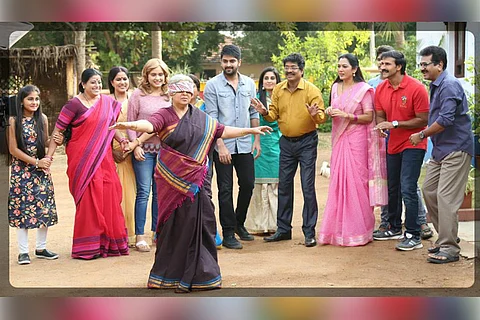

Telugu cinema seems to have made a promise to make at least one family film a year. By family films, I purely mean the largeness of the cast where members of a well-to-do family sing-and-dance, resolve their differences, shed tears as part of a nostalgic tribute and so on. Also, you can take your seniors and juniors along with you to the theatre and not have to hide your smile in the darkness of the hall (as is the case of adult comedies).
2016 had Brahmotsavam, 2017 had Sathamanam Bhavati and this year there's Ammammagarillu. I remember reading somewhere that we – as children – go to our maternal grandparents’ house to indulge in fun and frolic during summer holidays as our familial setting is such that we live with our paternal grandparents for most of our childhood (and well into adulthood, too, many a time!).
Santhosh (Naga Shourya) might be considered an emotional fool in today’s times. He wants to bring together his egotistic uncle (Rao Ramesh), gold-loving aunt (Hema), unsmiling workaholic uncle (Sivaji Raja) and another money-minded uncle (Ravi Prakash) to cheer his grand mom (Sumithra) up. The film treads along familiar lines – it is set in a small town, the hero’s aunts and uncles live in different cities, the hero has a crush on his first cousin – and packs in enough sentiments to make you sit without looking at the exit for two and a half hours.
At a time when filmmakers are experimenting with biopics and superhero subjects, it’s kind of amazing to see such an easy-breezy film occupy the big screens. I have said this before and I’m saying it again – Rao Ramesh is a delight to watch. Whether he’s repeating his Brahmotsavam avatar (as a person who wants to earn name and fame without anybody’s emotional support) or monkey-dancing to “Kevvu Keka”, he uncreases the proceedings with his mirthful acting.
There’s a quaint scene that stayed with me long after the film ended. Peketi Baburao (Rao Ramesh) calls out to his daughter from the gate – he shouts, “Amma, Amma” in an endearing tone and his mother appears first, but he continues to shout, “Amma, Amma” till his daughter (Shamili as Seetha) arrives. The mother, at this point, reluctantly retraces her steps and fades into a corner. This scene plays out a couple of times until Baburao realises his fallacy. It’s a brilliant setup that ends in the typical mother-son hug. The producers would have surely clapped with tears of joy when listening to this situation during the narration.
Though Shamili isn’t reduced to a prop, it’s appalling to see what she’s offered. In fact, Shakalaka Shankar has more memorable dialogues and things to do in the movie than the leading lady. After her character’s playful introduction (at two different ages), she turns into a caricature. Sundar Surya, the writer-director, probably didn’t know what to do with her. He also gives too much importance to dialogues. Whenever a character begins to thank Santhosh for making her/him recognise the true worth of relationships, there’s a sermon about how they lost those sepia-drenched memories to the drudgery of adult life. Has the director ever heard of “show, don't tell”?
The over usage of dialogues also crushes the film’s capacity to soar beyond the village-based movie template. Several attempts have been made to retell the magic of Krishna Vamsi’s classics: Ninne Pelladatha and Murari. But Ammammagarillu looks like one of those half-hearted efforts. The quality of Vamsi’s love story in Murari or the geniality in Ninne Pelladatha is untouchable. Why, even the same director couldn’t recreate that warmth in Mogudu and Govindudu Andarivadele!